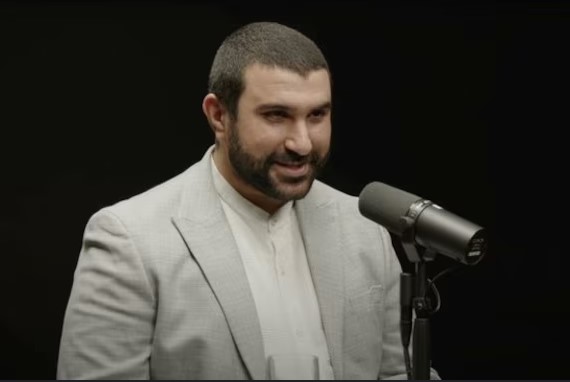British political commentator Sami Hamdi has been detained by US Immigration and Customs Enforcement (ICE) after his visa was revoked, stopping his American speaking tour midway. A Department of Homeland Security (DHS) official confirmed that Hamdi is currently in US immigration custody and faces removal from the country. The case has gained global attention because of its connection to Hamdi’s public remarks on the Israel-Gaza conflict.
US Immigration Revokes Visa and Detains British Commentator
DHS spokesperson Tricia McLaughlin said that President Trump’s ongoing immigration policies led to the decision. She wrote on social media that the administration would not allow “those who support terrorism and undermine American national security” to work or visit the country. Moreover, she added that US immigration authorities revoked Hamdi’s visa and were processing his deportation.
ICE officers detained Hamdi at San Francisco International Airport as he prepared to board a flight to continue his speaking tour. In addition, the Council on American-Islamic Relations (CAIR) confirmed that he had just spoken at a gala in Sacramento, California, and planned to appear next in Florida.
Judge allows ICE to continue immigration courthouse arrests in New York City
As a result, the sudden action by US immigration officials has drawn strong reactions from civil rights groups and the media. Hamdi is well-known as a political analyst and commentator, frequently appearing on British television networks like Sky News to discuss global issues and Middle Eastern politics. In other words, his detention has become a subject of widespread public debate both in the United States and abroad.
Reactions to US Immigration Detention and Growing Criticism
The Council on American-Islamic Relations (CAIR), one of the largest Muslim civil rights organizations in the United States, condemned the US immigration detention of Sami Hamdi. In its official statement, CAIR described his arrest as a “blatant attack on free speech”, claiming that the move was retaliation for his criticism of the Israeli government.
CAIR’s deputy director, Edward Ahmed Mitchell, stated that Hamdi had consistently denied any links to extremist groups or militant organizations. The group accused US immigration authorities of detaining a respected journalist simply for opposing Israel’s military actions in Gaza.
CAIR further claimed that the Trump administration’s policies have created a climate of fear, where immigration authorities target people based on political views or religious background. The US immigration crackdown since January has expanded social media vetting and led to the revocation of visas for people who posted messages in support of Palestinians. Some students and professionals have reportedly been deported for sharing such opinions online.
USCIS reveals 275 cases of suspected immigration fraud in Minnesota operation
Supporters of the administration argue that these actions protect national security. Several conservative commentators had called for US immigration services to remove Hamdi from the country, accusing him of spreading anti-American and anti-Israel sentiments.
However, CAIR insists that Hamdi’s talks focused on political analysis and humanitarian perspectives rather than incitement or hate speech. The organization has called for his immediate release from US immigration custody, saying that his detention violates the principles of free expression and international fairness.
Context of the Israel-Gaza War and Heightened Sensitivities
The timing of the US immigration action against Hamdi coincides with growing international tension over the Israel-Gaza war. The conflict began on October 7, 2023, when Hamas launched an attack on southern Israeli communities, killing about 1,200 Israelis and taking more than 200 hostages into Gaza.
In response, Israel began a large-scale military offensive that has devastated much of the Gaza Strip. The United Nations estimates that tens of thousands of Palestinians have been killed, and widespread destruction has left millions displaced. A UN commission of inquiry recently concluded that Israel’s actions amounted to genocide, although Israel strongly rejects that accusation.
Israel maintains that its strikes target Hamas militants, not civilians, and insists that it is defending itself against terrorism. Meanwhile, global protests continue to demand an end to the violence, with many activists urging governments to stop supplying arms and political support to Israel.
Hamdi has often used his media appearances to criticize Israel’s military actions and support Palestinian rights. Moreover, his stance, shared by several humanitarian groups, has drawn attention from US immigration officials.
Under Trump’s administration, US immigration authorities tightened their screening of foreign speakers and journalists seen as opposing American interests. In other words, the government increased scrutiny of voices it viewed as politically sensitive or critical of its allies.
As a result, reports say Hamdi remains in US immigration custody awaiting deportation, while the UK’s Foreign Office has yet to comment. Meanwhile, civil rights groups claim US immigration enforcement is using his detention to silence political speech, therefore sparking global concern over free expression. In short, the case has become a symbol of rising tension between immigration control and freedom of speech.
